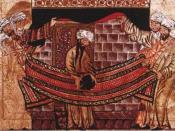When Charles Martel defeated the Muslims in Spain and stopped their advance into greater
Europe, he most likely did not know just how much of an effect his victory had on the history of not
only Europe, but of the known world. The fact that Islam may have overtaken the rest of the world
had it not been for that crucial battle attests to the strength of this relatively new religion. If the
strength of the religion is dependent upon those who start it, then it is important to analyze the life of
the one key character in history who began it all: Muhammad.
Muhammad was born in 570 AD, and was soon an orphan without parents. He was raised by a
family of modest means and was forced to work to support himself at an early age. He worked with a
travelling caravan as a driver and at the age of twenty-five, married his employer, a woman by the
name of Khadija, by which he had four daughters and no sons.
In Mecca, the Ka'ba had long been a pagan pilgrimage site. A black stone which has fallen to the
earth was kept in the cube which also held 360 idols representing different gods and prophets, one
for each degree of the earth. The environment in which Muhammad was raised was a polytheistic
society which had a strong emphasis on religion but not religious purity.
This upset Muhammad greatly, and he began to speak out against the idolatry. By this time
Muhammad had gained a large following. By the age of forty, Muhammad began to receive visits
from the angel Gabriel, who recited God's word to him at irregular intervals. These recitations, known
as the Qur'an, were compiled by Muhammad's followers around 650 or 651.
The basic message Muhammad...


